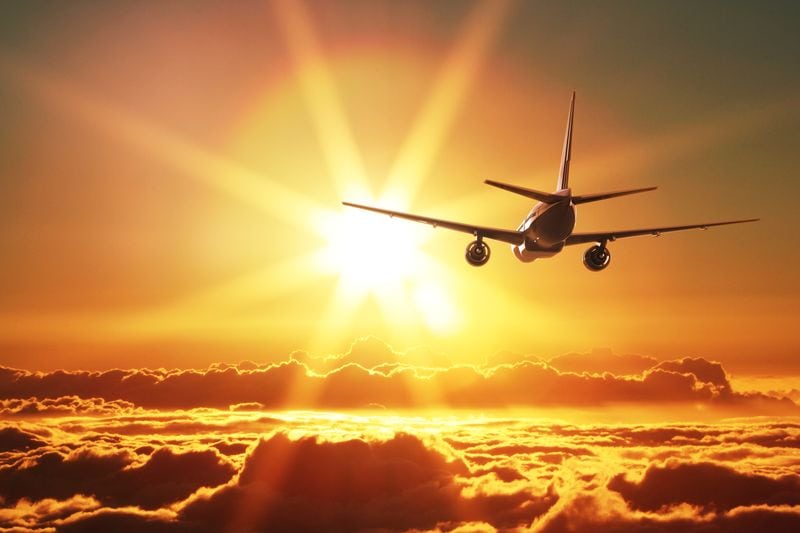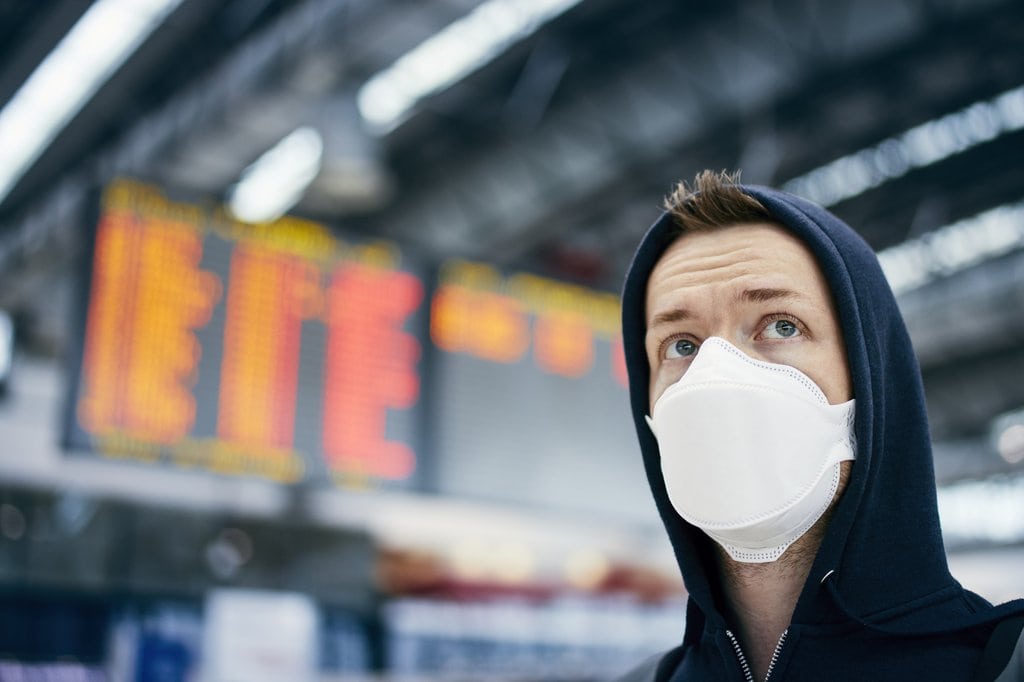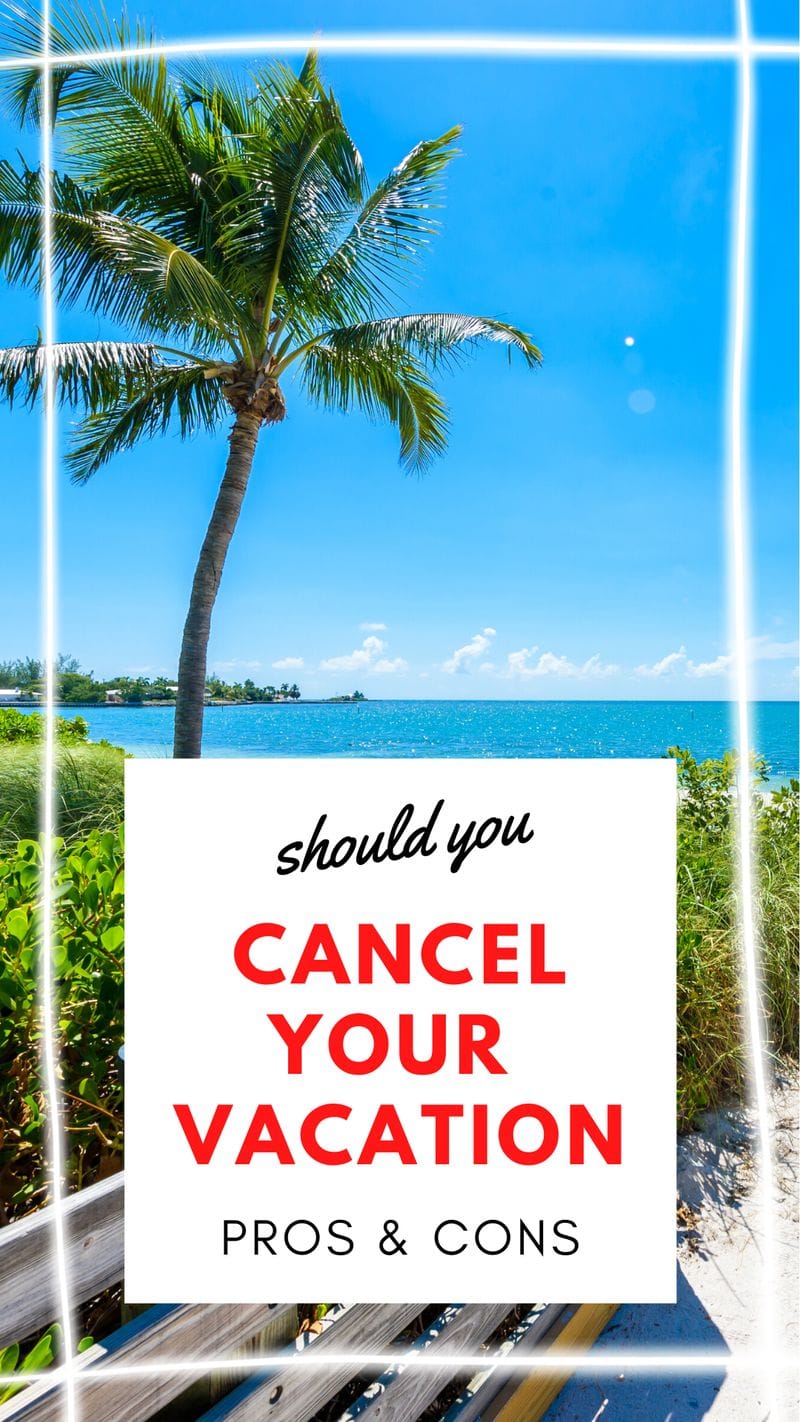
Wondering if you should cancel your upcoming trip?
With a near constant stream of worldwide shutdowns and mandated social distancing related to the COVID-19 Coronavirus pandemic, including closures of complete cities and even countries, you might be right to be worried. We’ve gotten a lot of emails over the past few weeks asking for our opinion on the matter so here it is.
Should you cancel your travel plans for the next three months?
In a nutshell, if you have plans to travel in the next 3 months our opinion is that yes, you should cancel now.
If you’re planning anything after the next 3 months our response is a little longer and you’ll need to read farther below.
The truth is, if you have travel plans in the next few months, your airline and destination country may have already made the choice for you. It’s likely your flight’s been cancelled (or will be cancelled soon), or your destination country has banned entry for everything but essential travel. Your home country may already have imposed a self-isolation period for re-entry and if your travel insurance company hasn’t cancelled coverage, it may soon.
If this is the case, and your trips have been cancelled, scroll down to check out our tips for recouping your costs as best you can.
If your flights haven’t been cancelled, or borders haven’t been closed, then there’s a strong risk this may happen. The reality is that the COVID-19 pandemic has affected most of the planet already (see country-specific data here), and even if the region you’re planning to travel to doesn’t have many cases right now, exactly when and where a major outbreak will occur next is anyone’s guess.
On top of all that, many countries have a mandatory quarantine on arrival, or heavy travel restrictions. There’s also a danger of airline bankruptcies and last minute flight schedule changes. Also note that if your flight is cancelled, you’ll likely get a credit or voucher instead of a refund.
Governments and cancellations notwithstanding, you also have a moral issue to consider. If you travel, you may well become infected, or worse, infect someone else.

Should you cancel your travel plans for the next four months to a year?
But what if your travel plans are three to six months out, or even longer? Should you cancel your long term travel plans?
That said, and before we get into this, this article is just designed to help you think through your options as best as you can, and help you recover any costs if you need to cancel.
We’re going to talk you through some things to consider when thinking about canceling your travel plans for the longer term.
No one knows right now how long the pandemic will last, if there will be a second or even third wave, or how long borders will remain closed. In our home country of Canada, social distancing and border closures may be likely to continue (as a best case) into July.
We really don’t know how long this will go on, and travel may be restricted until we get a high enough proportion of people who are immune (herd immunity), or until a vaccine is developed. There’s so much that’s unknown. See this Forbes article for a good discussion of how long social distancing may last.
The realities and risks of travel during an outbreak
I won’t go deep into the personal negatives and positives of travel during an pandemic event such as COVID-19 creates, but you can imagine they include everything from cruises and flights cancelled to even roadways being barricaded as well as curfews and outright travel bans in certain countries.
Activities involving large public gatherings are being cancelled around the globe regardless of the lack of local cases. These include everything from festivals and concerts to large sporting events like the Olympics.
Couple that with complete museum shutdowns, art gallery closures, restricted hours in restaurants and shopping malls, as well as local shortages in everything from toilet paper and paper towels to hand sanitizers and bottled water, and you have the making of a disaster movie rather than a vacation that you’ve saved and dreamed about for years.
In truth, you’re not wrong to be worried that your dream vacation or once in a lifetime trip won’t be the same as it would have beee even a few months ago.
With all that said, you have to decide for yourself whether cancelling your upcoming trip now due to the Coronavirus is the right thing for you.
What’s your trip worth emotionally?
The most important thing you need to ask yourself before deciding to cancel any trip is what’s the trip worth to you personally? I’m not talking financially, I’m talking emotionally, spiritually or physically.
I hate to break the near magical allure your upcoming trip represents, but if you’re still seriously thinking about taking your trip regardless of the Coronavirus outbreak and it’s many enforced border closures and travel bans, you need to distance yourself for a minute and look at why you’re going on this trip in the first place.
What are your goals for the trip?
Specifically, what are your trying to accomplish by going on this trip?
Is it simply you need a break from the monotony of your everyday life? Is it because you’ve always dreamed of going there? Is it the romantic idea of eating croissants while staring up at the Eiffel Tower? Is it the draw of the ocean/mountains/lakes/warm weather or the incredible sights of distant lands? Are you traveling for the local cuisine, a major event, or maybe a family reunion?
In truth, we’ve traveled for all these and in all likelihood, your trip is going to feature a few of everything above as well. Besides for your local government and the government of the place you’re heading to, only you can decide whether those things are worth traveling for and/or risking your health, your loved ones health as well as the health of the people you meet during your travels.
Listing out the true reasons for traveling might also help you come up with travel alternatives (or, as I like to call them, temporary mental breaks until you can take your eventual trip).
What’s your trip worth financially?
Of course a major factor when deciding to cancel a trip is the monetary aspects. The first question I ask anyone thinking about planning a trip is can they live with the costs if things go awry at the last second?
If you’ve saved for years, rented out your place while you were supposed to be away or committed to certain responsibilities such as working abroad or volunteering, then you have more riding on this trip than someone heading to Vegas for the weekend.
If you can’t cancel your trip without going deep into the red, the second question I always ask is are you insured?
We believe travel insurance is a vital necessity to everyone. Don’t believe us? We’ve written several posts about travel insurance in the past and wouldn’t dream of leaving our home country without it. We’ve just heard too many horror stories of people being caught without travel health insurance to risk it.
That being said, while we strongly believe in travel health insurance, we haven’t always opted for travel cancellation insurance. To be frank, in the nearly 20 years that we’ve been together, we’ve only canceled a few of our trips and managed to either cancel or rebook flights, cars and hotels at a minimal cost to ourselves.
To be fair, we always try to maximize our options and tend to book hotels that let us cancel up until a few days before arrival. We also nearly always book car rentals, bus and train tickets and even plane trips that give us an out with minimal costs if our plans change.
For times when we have to prepay a large expense, such as all inclusive multi-week trips or tours with minimal cancellation policies, we’ll often spend the extra on the trip cancellation policy or be willing to eat the costs if things don’t go as planned.
Cancellation options
If you’re already booked in, you need to seriously look at your cancellation options before cancelling.
Does your plane, bus or train allow cancellations? Does your hotel accept cancellations? How about any tours or major events you’ve already paid for? In reality, you need to look at every item on your trip that has cost you money already, that you’ve left a deposit on, or are tied into paying.
The next thing you need to find out is if can you cancel and get a refund for any of the above. If the majority of the things can’t be cancelled for free or at a low cost to you, then you need to find out if you have cancellation insurance.
If you can’t get an all-out refund, see if you can get a credit, or even re-book for a (much) later date.
Trip cancellation insurance policies
If you have cancellation insurance, you also need to know if you’re covered for pandemics, since many insurance policies are not set up for this. Many travel insurance cancellation policies cover personal sickness, hurricanes or natural disasters (which may or may not include viral outbreaks), jury duty, work related issues or terrorism.
Each company and policy are different, so read up on yours. It’s probably a good idea to call your insurance provider and find out firsthand what they do and don’t cover as well so you’re not surprised if you have to cancel last minute.
Can you postpone your trip?
Like all things, eventually this Coronavirus outbreak will pass, eventually. Either a vaccine will come out that vaccinates the majority of the population, or the virus will have run its course and will just be another thing that people live with. How long this can take is a complete unknown at this point, however it could be years before life returns to a new normal around the globe.
The SARS outbreak lasted six months, and only affected certain countries, however worldwide travel was disrupted for much longer due to it. From everything I’ve read, this is going to last far longer, and has already had a much, much bigger impact.
Are you in a high risk group, or do you have contact with someone who is?
This might seem like a morbid question, however the current reality is that COVID-19 is higher risk for some people, like the elderly and the immune compromised. That doesn’t mean that if you’re young and healthy you’re immune to the virus however, at this moment, statistically speaking, people over 65, and people with some underlying health conditions are a higher risk.
This could play a large role in deciding to travel right away. The simple fact is that the more you surround yourself with other people, the higher your chance of getting sick. Whether that means being surrounded by other people in a closed airplane or bus, going to a major concert or event, or even just hanging out in large groups and gatherings, the more people you interact with on a close basis, the higher your risk of infection.
If you get infected, not only could you get seriously ill, you could pass the virus on to other people, including people who are at higher risk.
This is why so many large events are being cancelled and large public places (such as museums) remain closed in most areas. If you are more susceptible to the Coronavirus and, contracting the Covid-19 virus can potentially get you killed, then maybe doing everything you can to lessen that risk is a good idea. This probably includes cancelling your upcoming trip.
Can you afford an extended absence?
Cruise ship passengers quarantined for weeks, borders indefinitely closed around the world, and flights cancelled at the last minute are all current realities in the news right now. Countries are struggling to repatriate their own citizens, never mind allowing unknowns to move freely in their region.
When an outbreak or natural disaster occurs, there’s always a chance that your two week trip may become a month long trip or longer. Not only do you need to calculate how much not going on your trip might cost, you need to calculate how much being quarantined or stranded away from your home might cost.
Depending on the circumstances, you could be on the hook for extended hotel and food costs, the costs for alternative return airfare and of course any pet or house costs you have back home in your absence. You also have to worry about being self quarantined when you return from your trip. For a lot of countries, that means 14 days of not leaving the house (at all) when you return from abroad.
Home means safety for many people
An added bonus of being at home during one of these events is that you likely have friends and family to lean on, a place to hunker down in, resources and areas you know to rely on, etc.
Whether it’s a viral outbreak like COVID-19 or something else, the chances that if you’re unlucky enough to be caught in something while abroad, that your travel plans and timelines are going to compromised.
This, in turn, could affect your workplace, school or any important plans you have once you’re scheduled to return from your trip. While travel doesn’t automatically necessitate extra risk in regards to getting the Coronavirus, it can put you at the disadvantage that your timelines are no longer under your control.
This actually occurred to us while we were traveling in Asia during the SARS outbreak back in 2003.
We weren’t allowed to leave an area for an extra week and had to remain in the country while we waited for the border to re-open. This forced us to modify our plans, including rescheduling a flight and staying at a hotel a week longer than expected.
We didn’t miss work or anything important, however it showed us that travel plans can change drastically with little to no warning.
Can you modify your trip?
Perhaps you’ve weighed the risks and decided that cancelling your trip outright isn’t the best decision or you’re tied into it so much economically that you decided you’re going come hell or high water.
The danger still remains however. The larger the congregation of people in close quarters, the greater the chance of spreading the infection.
So, how do you minimize the danger? You can opt to stay clear of public spaces and limit your interactions with large groups of people. You can opt to visit smaller venues rather than the big ones. You can schedule more time to do local activities such as take a local cooking class or going on a smaller tour (if they’re open at all). Basically, anything you do to minimize your exposure (and exposing others to you) is a good thing whether you’re traveling across the world or across town.
Do travel deals seem too good to pass up?
I didn’t want to go into all this without also addressing the enormous elephant in the room. There are some crazy deals to be had in the travel area right now. I expect there will be even more as time goes on and tourism is down worldwide.
We’ve personally decided the risks of all the above outweigh the rewards of the brave and/or foolhardy, especially with a family.
We’re doing our part in social distancing and hope you all are currently doing the same.
Are you in more personal danger while you travel?
Reality dictates that you’re in danger of catching COVID-19 regardless of where you are. Of course, limiting your interactions with other people, following basic safety guidelines such as washing your hands often, not touching your face (notably your mouth, nose and eyes) while out and about, coughing into your sleeve, sterilizing your surroundings, wearing a mask and gloves while in public, etc. all hold true whether at home or abroad.
The fact is, staying at home, limiting your interactions with other people and following the above precautions are your best chances of not contracting the virus at this time. The second you go outside those parameters, your chances increase tremendously. You also increase the risk of passing on the virus to other people.
When you travel, everything from the ordinary, like staying in a hotel room or AirBNB that is cleaned by other people; eating in a restaurant, where the food is prepared by other people and the chairs, tables and that condiment bottle have been used by even more people or walking into a store, cab or bus seat that have just been used are all additional chances of contracting the virus that you don’t necessarily have to face when you stay at home.
In the bigger scheme, your country should have travel advisories letting you know which places are best avoided and the CDC and WHO sites should give you extra information as well.
Can you live with the decision?
Regardless of whether you cancel your travel plans due to Covid-19 or not, realize that it’s your decision and you will be the one that has to live with it.
We believe that, as travelers, we not only have the right to protect ourselves, we have a right not to infect others as well. The old travel adage of taking only pictures and leaving only footprints applies not only to nature but to everyplace humans tread.
If you have contracted the virus or believe you might have, please seek medical advice and quarantine yourself and any family members that are sick.
While you might live through it, others you meet on your journey might not be so lucky. It doesn’t take a genius to realize cases outside of China, where the virus likely originated, has been the result of an infected traveler. Regardless of putting your own health on the line, please don’t subject others to your decision and travel responsibly.
Here’s hoping a speedy return to normal for those opting to cancel it all and safe travels for everyone else.







